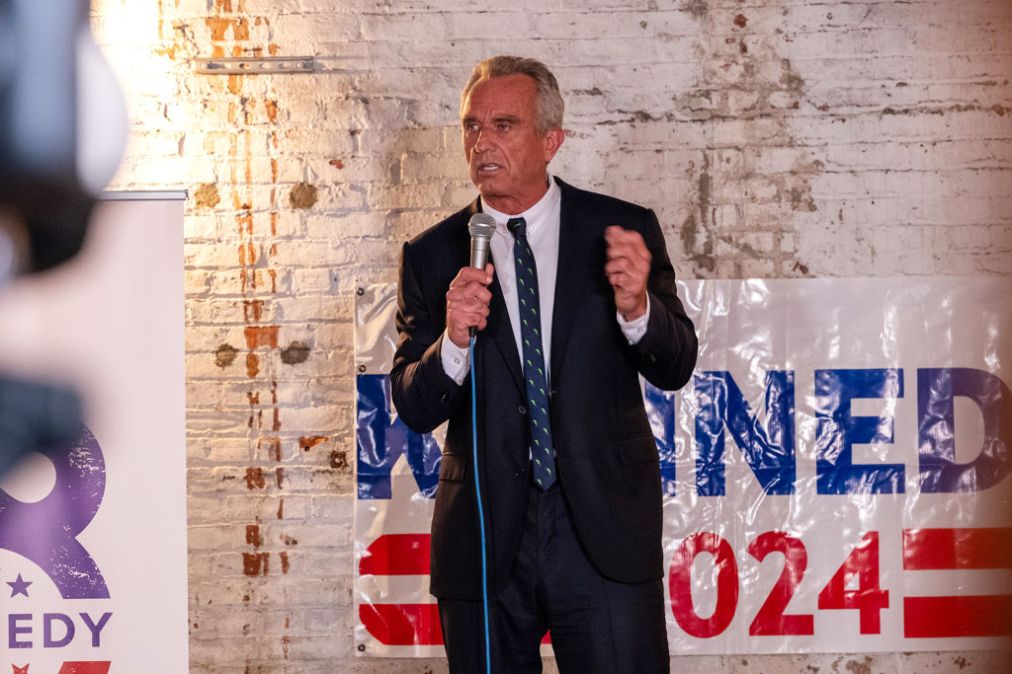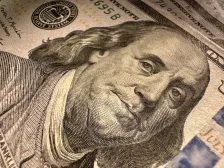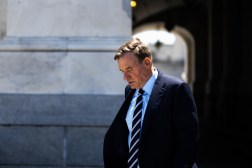Pair of lawsuits seek to revive fight over alleged censorship campaigns

The Supreme Court’s decision last month to dismiss a lawsuit claiming that the federal government pressured social media companies to remove content delivered a victory for supporters of online content moderation, but in that ruling’s aftermath, a pair of cases winding their way through the judiciary could force a re-examination of when the government and researchers can share notes about false information with online platforms.
In the case decided last month — Murthy v. Missouri — the Supreme Court issued a narrow ruling determining that the states which brought the case lacked the standing to argue that U.S. government communications with social media platforms regarding online mis- and disinformation had violated their rights.
In doing so, the court avoided weighing in on the First Amendment questions raised by social media content moderation regimes. But the two cases currently under consideration — including one brought by the presidential candidate and vaccine conspiracy theorist Robert F. Kennedy Jr. — are trying to force the Supreme Court to more closely scrutinize whether sharing information regarding mis- and disinformation by the government and by researchers effectively coerced platforms to take down protected speech.
Jennifer Jones, a staff attorney at the Knight First Amendment Institute at Columbia University, told Scoop News Group that the standing decision in Murthy provides “little guidance on the limits that the First Amendment places on government efforts to pressure social media platforms into suppressing speech.”
“If plaintiffs in future cases are able to establish a closer link between the alleged government coercion and action that was taken by the platforms against their account, we may see the Court actually weigh in on the merits of the First Amendment question,” Jones said in an email.
The two pending lawsuits take slightly different approaches. Kennedy’s lawsuit challenges the government’s role in the removal of his own COVID-related posts, which his lawyers contend strengthens his standing. Like in Murthy, Kennedy argues that the defendants — a smattering of more than four dozen federal agencies and officials — violated the First Amendment by flagging social media posts seen as spreading misinformation to be taken down and that they should be enjoined from doing so.
The other lawsuit, brought by two individuals who were also plaintiffs in Murthy, targets academic institutions and disinformation researchers whose work also came up in the earlier case. The suit alleges that these researchers violated both the First and Fourteenth Amendments by colluding with the government to flag online speech — that qualifies in the view of the defendants as misinformation — so that it can be taken down. The suit asks the court to enjoin the defendants “and all persons acting in concert or participation with them” and grant monetary damages.
To succeed where Murthy did not, these cases must establish a clearer link between government coercion and decisions by social media companies to remove content. And while possible, that could prove difficult, legal experts told Scoop News Group.
“It’s hard to know what kind of plaintiff is going to be able to get past the kind of bar that the court set up,” said Paul Gowder, a professor and associate dean of research and intellectual life at Northwestern University’s Pritzker School of Law.
Ultimately in Murthy, a majority of the justices decided that the states and individuals who brought the lawsuit failed to prove that there was “a real and immediate threat of repeated injury.”
Gowder said that long before Murthy, the Supreme Court ruled in a case about police chokeholds that a plaintiff seeking injunctive relief must show that the issue they aim to stop is likely to affect them in the future. In Murthy, “the court really draws on that kind of idea,” he said, setting a “high bar” to clear.
But one factor working in the plaintiffs’ favor is that their cases aim to take the same path through the federal judiciary as Murthy, starting in the Monroe division of the U.S. District Court for the Western District of Louisiana before Chief Judge Terry Doughty, which sits within the U.S. Court of Appeals for the Fifth Circuit. The Monroe division has been a favorite of Republican attorneys general seeking to challenge Biden administration policies in recent years, and the Fifth Circuit has consistently been sympathetic to conservative legal arguments.
RFK Jr.’s challenge
Kennedy’s lawsuit with the nonprofit he chairs, Children’s Health Defense (CHD), challenges the removal of COVID-related posts and accounts on the social media sites Facebook, Instagram, Twitter and YouTube.
The suit names more than 50 federal officials and agencies as defendants — including President Joe Biden, Surgeon General Vivek Murthy, the FBI, and the Cybersecurity and Infrastructure Security Agency — and alleges they “waged a systematic, concerted campaign” to censor the constitutionally protected speech of Kennedy and CHD.
Kennedy’s Instagram account was banned in 2021 for violating the platform’s rules around COVID-19, but parent company Meta restored the account in June, citing his status as an active presidential candidate. In court filings, Kennedy claims he was directly targeted by the White House, which allegedly sought to pressure social media platforms to remove or limit the reach of his posts regarding COVID-19 and vaccines.
As an example, his lawyers pointed to comments from then-White House press secretary Jen Psaki in 2021, when she said “there’s about 12 people who are producing 65% of anti-vaccine misinformation on social media platforms.” Psaki’s statement was derived from a report from the Center for Countering Digital Hate that identified Kennedy as one of the 12 individuals.
Meta’s Instagram ban on Kennedy’s account did not extend to Facebook, which the company also owns, and this reportedly caused tension with the White House. Instagram and Facebook also banned accounts for Children’s Health Defense in 2022.
While Kennedy received a favorable judgment for his lawsuit from Doughty of the Western District Court of Louisiana, the Fifth Circuit last week remanded the case to the district court, asking it to review Kennedy’s standing argument again in light of Murthy.
The Fifth Circuit said it acknowledged that the Kennedy plaintiffs “assert at least some different, and perhaps stronger, grounds for standing than the plaintiffs in Murthy” but said the record in the case isn’t fully developed, giving the panel one month to make a determination.
Shortly after the Murthy case was dismissed, supporters of the lawsuit quickly moved to highlight the case as a more worthy successor. Kennedy’s lead attorney Jed Rubenfeld took to the opinion pages of the Wall Street Journal to argue that “unlike the Murthy plaintiffs, Mr. Kennedy and CHD are still being censored.”
On July 10, Kennedy’s lawyers filed a motion directly referencing the Murthy decision, arguing that the independent’s presidential run made the prospect of direct future harm more likely.
“The chief difference between this action and Murthy is the identity of the plaintiffs. The Kennedy Plaintiffs have a very different, ‘strong claim to standing,’ and Mr. Kennedy in particular, as a candidate for President, has an urgent claim to relief,” attorneys wrote.
Rubenfeld and other attorneys representing Kennedy and CHD did not respond to multiple requests for comment.
Murthy plaintiffs try again
In the other lawsuit, two Murthy plaintiffs allege that researchers at Stanford, the University of Washington, the social media analysis company Graphika, the Atlantic Council and the Aspen Institute worked with state and federal government officials to coerce social media companies to censor their content.
The plaintiffs are Jill Hines, who leads a Louisiana-based health organization that advocates against vaccine mandates, and Jim Hoft, owner of The Gateway Pundit, a far-right website notorious for sharing misinformation. They argue that their alleged censorship at the hands of social media platforms was facilitated through two research programs: the Election Integrity Partnership, which focused on election disinformation, and the Virality Project, which targeted COVID-19 disinformation.
Attorneys for Hines and Hoft describe the programs as “mass surveillance” initiatives and allege that the defendants colluded with platforms and government officials “to monitor and censor disfavored speakers and content,” including their own related to COVID-19 and elections.
Both the Election Integrity Partnership and the Virality Project, which have since concluded, were also at issue in Murthy. In that case, the Supreme Court ultimately said that Hines, Hoft and other plaintiffs failed “by and large, to link their past social-media restrictions to the defendants’ communications with the platforms.” Despite noting that Hines’ “superior showing on past harm” is better positioned to demonstrate potential future harm, the high court concluded “she has not shown enough.”
The defendants in Hines and Hoft’s most recent case are now trying to use the Murthy ruling to their advantage.
During oral arguments before the Fifth Circuit on July 11, Elisabeth Theodore, a partner at Arnold & Porter who represents the researchers, argued Hines and Hoft don’t meet the standards set in Murthy.
Theodore said Murthy established that plaintiffs must allege “facts showing specific causation with respect to each discrete instance of content moderation” and that the censorship was inconsistent with the platform’s own independent judgment.
“I think the court could quite easily take those standards and say that there is nothing remotely in this complaint that satisfies those standards,” Theodore said.
Future challenges
Legal experts said the road ahead for the plaintiffs hoping to curtail efforts to pass information between the government, researchers and the private sector is likely to be challenging.
Though the outcome of Murthy hinged on standing, the majority opinion took a dim view of many of the central arguments by plaintiffs that social media companies would not have restricted or moderated their posts without government coercion, or that they could reasonably prove they were at risk for future harm.
Gowder said he saw what the court did in Murthy as a “foregone conclusion” because social media companies have a business interest in moderating their content that exists outside of whether or not the government communicated with them about posts. The court’s majority opinion, he said, appeared to account for that.
“The fundamental business model of social media companies is that they want to give mass market ordinary consumers an incentive to spend lots of time there, and they want to give advertisers a reason to put their ads next to the content that these ordinary mass market consumers have produced,” Gowder said.
Gowri Ramachandran, deputy director of elections and government at the Brennan Center for Justice, said even though the Supreme Court ruled on standing, it “went out of its way” to state “that the district court had committed clear factual error when it looked at the actual facts and the evidence in the Murthy case.”
A lot of those facts and evidence, Ramachandran said, are similar in the other active cases. The factual issue underlying Murthy was that there wasn’t a connection between anything done by the government and the decisions of the social media companies.
“That same issue is going to be there for the plaintiffs in these cases,” Ramanchandran said.






